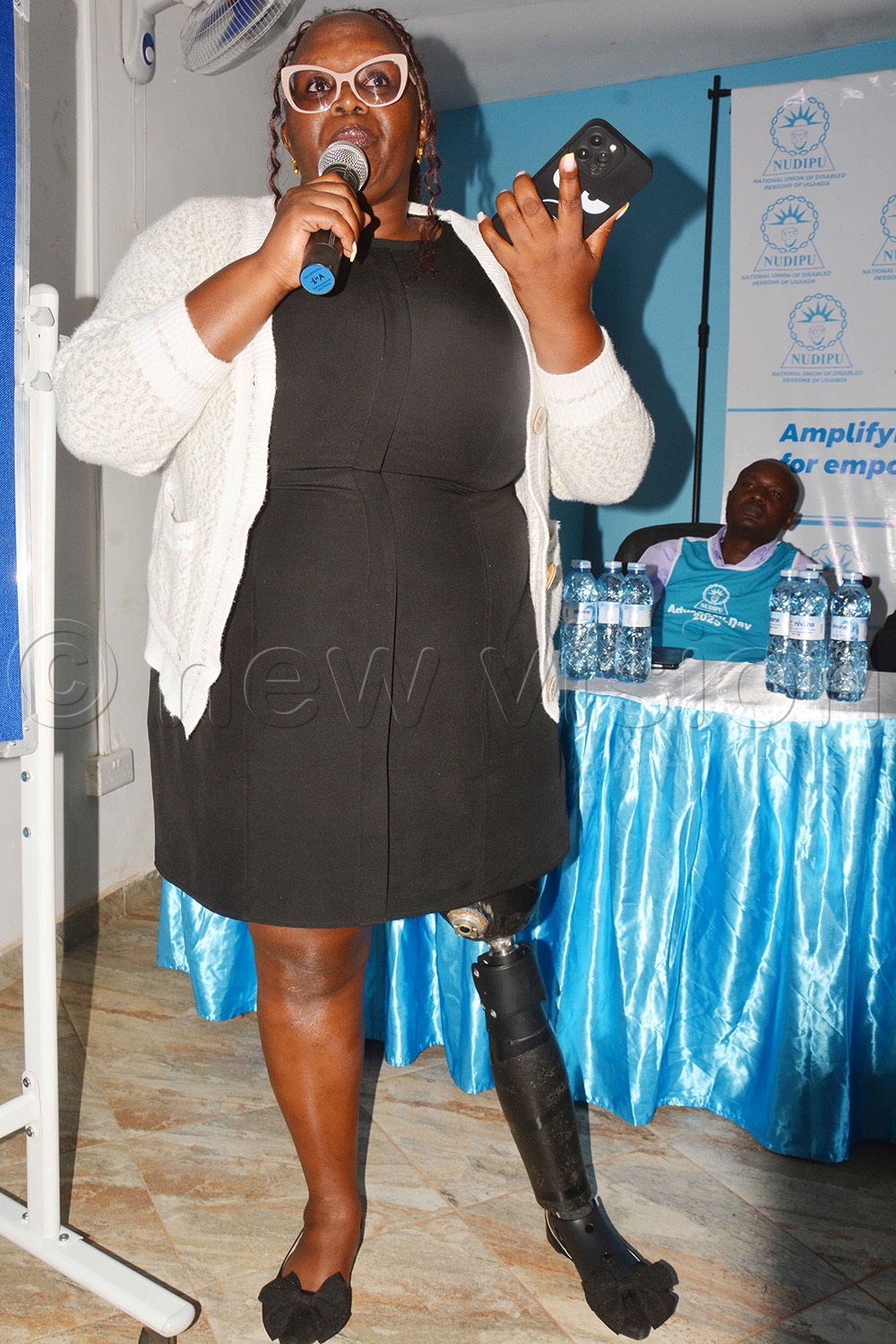Sh800m appeal launched to fund artificial limbs for PWDs
According to the chief executive officer of the National Union of Disabled Persons of Uganda (NUDIPU), Esther Kyozira, the funds will aid persons who have lost limbs through accidents and illness.
The country director of Norwegian Association of Disabled (NAD) Edson Ngirabakunzi (third right seated), chief executive officer of NUDIPU Esther Kyozira (fourth right second row) pose for a group photo with participants after a press conference at NUDIPU headquarters in Kampala on October 13, 2025. (Photo by Francis Emorut)
__________________
Persons with disabilities (PWDs) are seeking sh800m to procure 200 artificial limbs for amputees.
According to the chief executive officer of the National Union of Disabled Persons of Uganda (NUDIPU), Esther Kyozira, the funds will aid persons who have lost limbs through accidents and illness.
She said the purchase of 200 artificial limbs is a drop in the ocean, as it is estimated that over 11,000 persons have lost their limbs due to accidents and illness out of the 5.5 million persons living with disability across the country.
“The move is intended to restore mobility, dignity, and independence to those who have lost limbs through accident, illness, or conflict,” Kyozira said.
Charlotte Kangume of Amputee Self Help Network Uganda said with an artificial limb, one is empowered to do business and become self reliant. (Photo by Francis Emorut)
Globally, it is estimated that 65 million people live with limb amputations, and nearly 1.5 million new amputations occur each year, with more than 80% of these taking place in low- and middle-income countries.
In Uganda, a review of national and regional referral hospitals found that 81.2% of amputations were of the lower limb, while 14.2% were upper-limb amputations. Gangrene accounted for about 30.3% of amputation causes, followed by road traffic accidents and diabetes.
“These numbers are not just statistics. They represent real people fathers, children, and young adults whose lives are constrained by barriers to mobility, dignity, and lack access to rehabilitation,” Kyozira said.
She made the remarks during a press conference on promoting disability-inclusive healthcare services at the organisation’s headquarters in Kampala on Monday, October 13.
Kyozira reaffirmed the organisation’s commitment to work with the Government of Uganda, the Ministry of Health, and all stakeholders to ensure that disability inclusiveness becomes a lived reality, not just an aspiration.
“We are committed to promoting disability-inclusive healthcare services. We are reminded that inclusion is not charity, it is justice. It is about ensuring that every Ugandan, regardless of ability, has access to quality and dignified healthcare,” she said.
She added that each limb is more than a device; it is a new lease on life, a step toward self-reliance, confidence, and renewed hope.
To put this need into perspective, in low-resource settings, as few as 3% of those who require prosthetic services actually have access to them.
During the press conference, the NUDIPU marathon initiative was launched. It will take place on November 9, 2025, at the Kyadondo Rugby Grounds in Lugogo.
Kyozira pointed out that there is a need to close the gap between policy and practice, and between promises and reality, as persons with disabilities are still grappling with challenges in accessing healthcare and education services.
“Despite Uganda's progressive legal and policy frameworks, many persons with disabilities still face overwhelming barriers when seeking inaccessible facilities, limited assistive equipment, communication challenges, and, at times, negative attitudes from health workers,” she said.
According to the country director of the Norwegian Association of Disabled (NAD), Edson Ngirabakunzi, each prosthetic limb, which costs sh4m, symbolises a story of renewed hope, restored dignity, and regained independence for the beneficiaries.
“It means a person who once struggled to walk will once again move freely and go to work. go to school to learn, and to live productive and meaningful life,” Ngirabakunzi said.
He said the marathon day, themed "Promoting Disability-Inclusive Healthcare Services", is timely to address the healthcare of amputees.
“This theme is not only timely and relevant, but it also reminds each and every one of us that healthcare is a right, not a privilege and that every Ugandan, including those with disabilities, must have inclusive and equitable access to quality health services,” he said.
He noted that persons with disabilities often face multiple barriers when seeking access to healthcare. These include inaccessible health facilities, lack of assistive devices, inadequate trained personnel, negative attitudes, and stigma.
“I wish to emphasise that inclusion cannot be achieved by one organisation alone. It requires all of us working together, walking together, and running together, in the spirit of partnership, brotherhood, and humanity.”
A call to action
- Development partners and civil society organisations should continue to integrate disability inclusion across all health and development interventions.
- Media and social media influencers should continue using digital platforms to inspire public support and dismantle stereotypes about disability.
Running for inclusion and hope
“Disability inclusion is not charity, it is about human rights, equity, and social justice. When we invest in inclusion, we strengthen families, communities, and our nation,” Ngirabakunzi said.